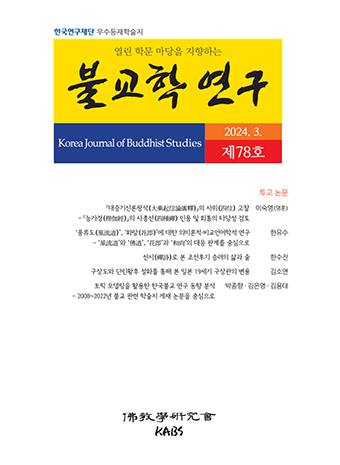Abstract
References
Sorry, not available.
Click the PDF button.
Information
The basic problem of theoretical dispute among the contemporary feminists is whether the femininity different from maleness exists as nature or not. Some feminists argue that woman equals man, so feminity is not exist. But others criticize that opinion, and say that because woman are different from man distinctly, the liberation of woman means that the world of woman is separated from that of man. In reference to this controversy, I present the view of woman based on the prajñā and the upāya which are in pairs of the Mahāyāna thought. According to the sight of prajñā, there is no substance in woman. And according to the vision of upāya, the characteristic experience of woman will be the meanings of way that save women. In addition, the bodhisattva's practice will keep balance of these two sights.I interpret gender trouble as suffering in the Four Noble Truths of Buddhism. So feminism represents the fourth Noble Truth, namely the path, and is defined as the bodhisattva's practice of the recent times in this paper.In the third chapter, I investigate the theory of Buddhist practice with feminists point of view. In the first place, the discourse on woman's practice is analyzed critically.The dualism in the doctrine of buddhist practice reveals another obstacle to solve gender issues through the buddhist practice. The doctrine includes dualistic composition, that is, feelings/wisdom, body/mind, statement/silence. Moreover, these elements constitute the hierarchical frame. Zen buddhism is appreciated that has dissolved the established discourse of buddhist practice. Therefore, we can find the possibility of breaking down the conventional notion from the tradition of zen buddhism. But, in spite of usefulness like this, because zen buddhism has formed androcentric lineage, this problem remains to be solved for feminist buddhism.Feelings, body, and statement are thought to play important roles in the practice of feminist buddhism which aims to solve the suffering of suppressed women, but we must not allow the idea that these elements belong to the female nature.Nevertheless, it is expected that new discourse contains these elements will transform the current theories of buddhist practice considerably.
Click the PDF button.
- Publisher :Korean Association of Buddhist Studies
- Publisher(Ko) :불교학연구회
- Journal Title :Korea Journal of Buddhist Studies
- Journal Title(Ko) :불교학연구
- Volume : 8
- No :0
- Pages :83~122


 Korea Journal of Buddhist Studies
Korea Journal of Buddhist Studies






